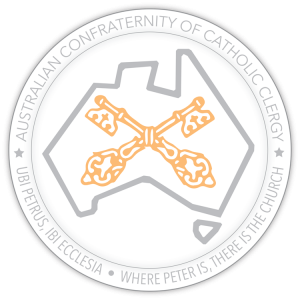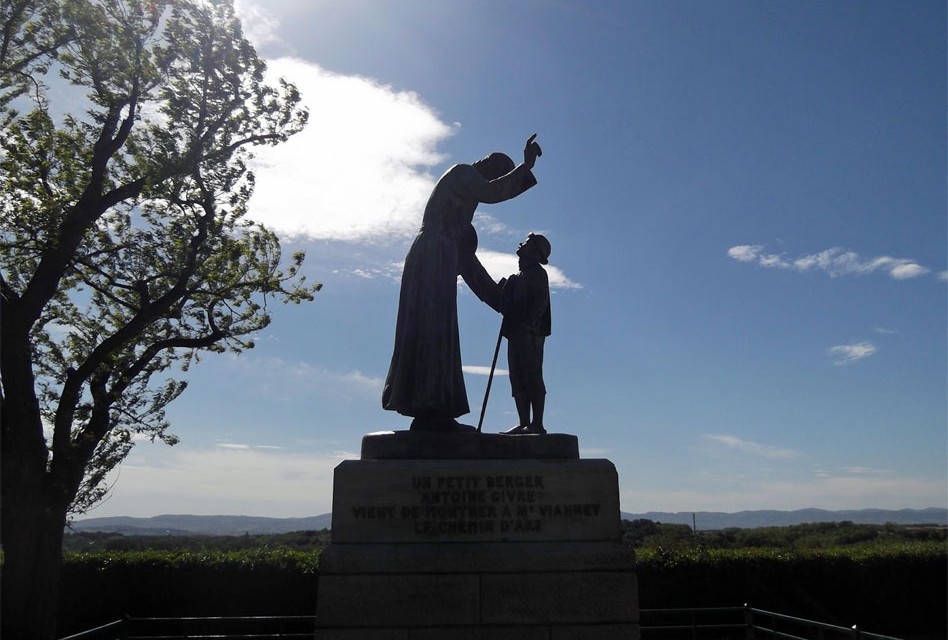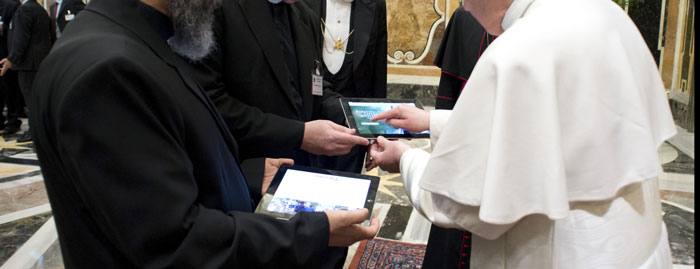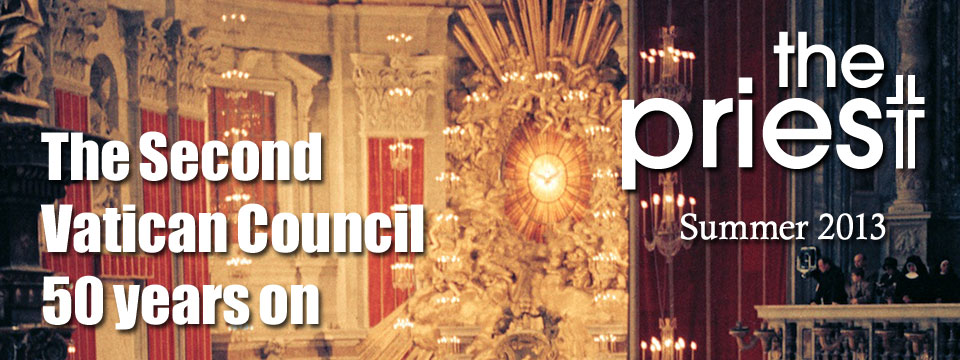There is a story in the life of the Holy Curé of Ars that goes like this: St Jean Marie Vianney, was on his the way to Ars, his first assignment, when he came to a fork in the road. Not knowing how to continue, it so happened that a boy from Ars came along. The young priest asked the local if he could point the way to Ars. After the boy had obliged, the priest replied, “You have shown me the way to Ars; now I will show you the way to heaven!”
Print Friendly Format
The need for personal holiness
To show the way to heaven. That is the first and foremost duty of the priest and the hierarchy. Christ alone is the way, the only way to heaven, because he alone is the Life and the Truth (cf. Jn 14:6). The priest leads men to heaven by giving them the divine life of grace by means of the sacraments, and the truth by means of the Magisterium of the Church. The dogmatic basis for understanding the ministerial priesthood is the priesthood of Christ himself, the Son of God made man. The mystery of the Incarnation — more properly speaking, the hypostatic union — is the key to understanding this. The human nature of Christ is provided with the highest grace possible: the grace of hypostatic union with the second Person of the most holy Trinity. Because of this grace, Christ is a priest forever. His most sublime priestly function is the offering of the redeeming sacrifice of the cross, which has the endless expiatory value and the infinite value of divine adoration. Being both priest and victim (sacerdos et hostia), he reveals, in a living and concrete way, his priestly dignity. The eternal Word, the second Person of the Trinity, possesses and sanctifies the humanity of Christ, and thus his priesthood. The personal being of the Son gives infinite value to Christ’s sacrifice and to each and every holy Mass. The humanity of Christ is the instrument, united directly to the Godhead (instrumentum coniunctum Divinitati). To be the priestly image of Christ and his living instrument, on the part of the human priest, requires being an image and an ever more docile instrument of Christ, also as regards the priest’s personal morality. In the traditional rite of ordination, the newly ordained are admonished with these words: “Diligenter considerate ordinem per vos susceptum.” (“Consider diligently the Order which you have received.”) The priest should continuously nourish in himself a very high estimation of his sacramental state. The grace of priestly ordination is given so that the priest may fulfill sacramental acts not only validly, but also with real holiness. Herein lies the great dignity and the reason for the high moral demands of the Catholic priesthood. St Mary Magdalene of Pazzi had such a great understanding of the priesthood that she conscientiusly addressed the chaplain of her religious community as “Christ.” She did the same for all other priests because she only saw Christ in them. The divine powers that the priest exercises in persona Christi Capitis bring him into the closest connection with Christ and into constant and complete dependency upon him. The life, the endeavors, and the glory of the priest belong, for this reason, to Jesus alone.The means to priestly holiness
What is the best means for the priest, in his personal way of life, to be an ever clearer image and an ever more docile instrument of Christ? It is that union with Christ, which the faith-filled, respectful, and loving celebration of the sacrifice of the Mass brings about. What makes the celebration spiritually fruitful is not only the respectful completion of the rites, but, above all else, prayerful preparation before and prayerful thanksgiving after holy Mass. Cardinal Herbert Vaughan, the former Archbishop of Westminster, addressed his priests in these words:“If we are deeply convinced that the holy Mass is the sum of our lives, around which all our actions and doings revolve, just as the course of the constellations must needs go around their centre; if we are deeply convinced that the offering of this holy sacrifice is the most sublime act we can ever perform, then we will strive to use our entire day for special and immediate preparation for it. It will not be difficult then, but, on the contrary, pleasant and easy, if we strive, first of all, for a living understanding of what holy Mass really is, and secondly, to make it a habit to recite often little ejaculatory prayers as a preparation for holy Mass.” {{1}} [[1]]Herbert Vaughan, The Young Priest: Conferences on the Apoctolic Life. Burn, Oates & Washbourne, London. 1905.[[1]]The Cardinal continues:
You might add to the Stabat Mater verse: “Fac, ut ardeat cor meum in amando Christum Deum”, the words: “et ut digne celebrem.”St Jean Marie Vianney remarks:
“If a priest becomes negligent in his way of life, it is because he does not celebrate Mass devoutly.”The way the priest treats the eucharistic species at the consecration, during the rite of communion, and during adoration, is a measure of how much the spirit and the image of Christ lives within him. As a shining example for a faith-filled, respectful and loving celebration of holy Mass, Pope Pius XII should be mentioned. Sr Pascalina Lehnert assisted at his daily Mass for about 40 years. She testifies:
“At 7:00 a.m. Pius XII goes to the chapel. He kneels on the big kneeler in preparation for the Divine Sacrifice. Then he goes to the altar. He puts the vestments on and says the prescribed prayers so clearly, that you can understand each syllable, and at the same time, not loudly or in a disturbing way. Now he begins the prayers at the foot of the altar. Deeply bowing and slowly, putting his soul into each individual word, he prays the Confiteor. Then he opens his arms wide, puts his eye and face up to the big ivory crucifix and goes up the step to the altar. I always found the Introit on the feasts of doctors of the Church so seemly for Pius XII himself: ‘In the midst of the Church, the Lord opened his mouth; he filled him with the Spirit of wisdom and understanding, he clothed him in a garment of glory…’ Sursum Corda! The preface follows. I do not know if it could be prayed more beautifully, more captivatingly. Then there is a moment of silence. The Holy Father thinks of all those, who have recommended themselves to his prayers and count on his prayers. The holy Mass comes to its highpoint: the Holy Father speaks the words of consecration with burning seraphic devotion and self-offering, so quietly, but yet so clearly, so full of faith and warm with love, that all those present are drawn into such a holy experience. From the cross, the eternal high priest looks upon his vicar and grants him the petitions that he presents in intimate prayer. … Then he opens his arms wide once more, to the crucified, and the blessing of the Christ’s vicar goes out, not only to those present, but to the whole world. His thanksgiving after Mass is long and intimate. A prelate who, by chance was able to witness it, was so taken by it, that it took him a long while before he could appear once more before the Holy Father.” {{2}} [[2]]Pascalina Lehnert, Ich Durfte Ihm Dienen. Bishop Schneider’s translation.[[2]]
Image and instrument in the Ministry of the Word
The priest’s task of being an image and instrument of Christ is also to be found in the ministry of the Word — ie: in the proclamation of the truth. In the celebration and administration of the sacraments, the priest mediates Christ, the Life. In the ministry of proclaiming, the priest mediates Christ, the Truth. Jesus Christ is the incarnate Word, the incarnate Wisdom, the incarnate Truth, incarnate Reason. Untruth, unclearness, and ambiguity are in contradiction to the very essence of God. Whenever someone rejects Christ, he always thereby rejects the truth. Love of untruth, of half truth, of unclearness, indifference toward the truth, making the truth relative, putting truth and untruth on the same level, all of this is to be found in the core of the sin of Adam and Eve. The effect of the proclamation of the Word, does not take place by means of the very act, in itself, of proclaiming (ex opere operato), but depends essentially on the qualities of the priest (ex opere operantis: his personal prayer, his way of life, study). Of course in the end it is God who touches souls through the proclaimed Word and illumines them, and it is God who gives the proclaiming priest the necessary, special actual graces. Christ himself is the Life and the Truth, and because Christ is indivisible, so also are the Life and the Truth indivisibly united with one another. The first separation between Life and Truth began with the sin of Adam and Eve. The negligence of the proclamation of truth, lack of zeal in the explanation and defense of the truth are a sin against Christ, the Truth. They imply a giving-in to the sophisticated and half-true whisperings of the devil, that father of lies, he who confuses. Christ came in order to destroy the kingdom of lies and build up his kingdom of truth, in order to free mankind from the darkness of lies and untruth:“For this I came into the world, to bear witness to the truth. He who is of the truth hears my voice.” (Jn 18:37)The Church founded by Christ is the kingdom of life, of supernatural divine grace, and at the same time the kingdom of truth. If you neglect one of these realities, you will disfigure the image of the Church; the life of the Church on earth will be crippled on one side.
An exhortation: speak the truth with faithfulness and courage
If you neglect the sacramental life, especially the life that comes through the most holy Eucharist, its respectful and worthy reception, its faith-filled adoration, then the principal nourishment for the soul will be lacking, the spiritual life will waste away. And because the soul cannot live without nourishment, it will seek nourishment from somewhere else: sure enough, in things of this world, in psychology, in nature, in self-glorification, in a focus on the physical, the sensual and purely natural man. The cry of the believing Psalmist, “Not unto us, O Lord, not unto us, but to thy name give the glory!” (Ps 113), becomes often, unnoticeably, and without admitting it, an opposite call: “To us, O Lord, to us, and to our name give the glory!” If you neglect to care for the purity of the truths of faith and their defense, you necessarily neglect Christ himself. If you neglect the defense of Christ, then you will possess less and less the spirit of Christ, then the supernatural light of faith will decrease, little by little. Alongside the only truth, which is Christ, you will put up other artificial theories, you will make the absolute claims of Christ merely relative. When did fallen human nature, our “old man”, wounded by original sin, ever love the truth, love being in the truth and living in it? “They loved the darkness more than the light,” said the Lord. (John 3:19) That means unclearness, loving relativism more than the luminous and rock-solid truth of Christ. Christ is the clearest light and the strongest rock of truth. He who does not care about, or take care to defend the luminous and rock-solid truths of the Catholic Faith, does not really love Christ. He does not “live in the truth.” (3 John 1:3) “Go and teach!” Christ instructed his apostles. (Mt 28:19) He did not say: Go and discuss and make questionnaires about my commandments. On the contrary, he said: “Go and teach all men to keep the commandments, which I have taught you.” (Mt 28:20) Moreover, Christ did not say: “Go and see if there is someone who, in an exceptional situation, cannot keep my commandments, make him feel better and approve of his way of life. Use pastoral creativity.”Pro Christo, pro veritate
The priesthood of the Church must, in its activity, be directed toward the truth and ever preserve itself from diminishing the claim of divine truths and their luminosity in the world, through inactivity and human respect. The whole being and consequently the whole activity of the priest and the Church depend on Christ and are directed toward him. One might put it like this: “sacerdos est pro Christo.” Pro Christo really means, always, pro veritate. Therein lies the priest’s being an image and instrument of Christ. The consciousness of this duty most clearly characterized the apostles. As St Paul expressed it, “We can do nothing against the truth, but only for the truth.” (2 Cor 13:8) If you weaken the principle pro veritate, then you will weaken the principle pro Christo in the life of the priest and the Church. If care for supernatural truths decreases, then priests’ and bishops’ interest in Christ decreases. In place of the interest in Christ, interest in pseudo-truths and a one-sided interest for temporal and secular concerns will grow: social justice, political activism, climate change, ecology, and so forth, under these key terms: “justice, peace, preservation of creation.”The insatiable appetite for novelty and innovation
Man’s mind always needs concrete nourishment: ideals and convictions for which the will is decided. As a consequence of the weakening of the principle pro veritate, a certain emptiness is left behind: emptiness that must be filled with new contents. New theories are constructed that correspond to the spirit of this world and the expectations of the majority. Pastoral documents are continuously produced, documents which have been previously debated according to parliamentary rules, which have been voted upon and which, for the most part, avoid any luminous and rock-solid expressions of the truth. Through all this, a void space is left in the life of some communities, of some priests and religious, and a new kind of spiritual atmosphere takes over, an atmosphere similar to that of Gnosis and Pelagianism. Priests and bishops who live in such an atmosphere begin to collaborate with the world, to be ‘politically correct.’ Indifference and shyness in the face of truth generate fear of public opinion and of the powerful of this world. Such behavior will not bring forth any confessors of the faith, but rather Scribes, who collaborate with the Herod and Pilate of all times, i.e., with the unbelieving world. Without any care for the purity of faith, for being certain of the truth, for standing in truth, a new religion emerges, a cult to the current and historically conditioned feelings of the time, a religion no stronger than reeds in the wind. Still more worthy of condemnation is a type of Gnostic behavior whereby one knows theoretically the validity of a divine truth, (e.g., the indissolubility of marriage; the holiness of the family), but at the same time legitimizes the exact opposite in practice (e.g., the reception of communion for the divorced and remarried), whereby one may support one’s position with supposed old traditions, which, in reality, are quite doubtful. The dignity of the “image and instrument of Christ, the Truth” contains an extremely pastoral duty, a duty by which priests enlighten the people by teaching the truth. Like wise doctors and merciful Samaritans, they heal the people from the wounds of untruth. The priest, and especially the bishop, as an instrument of the truth must pour upon the wounds of men, who have fallen among the robbers of the present age (i.e., among the spirits of untruth), first of all, the disinfecting, and thus often painful, wine of truth as well as the oil of consolation and patient instruction. Pope Saint Gregory the Great speaks about this in his Regula Pastoralis:“You should have love, but not unto arbitrariness and over-softness; goodness should not be such that it harms the guilty. Church leaders should have the courage, by means of zeal for justice, to rise up against the vice of evil-doers and by means of humility to be a companion of the just: “bene agentibus per humilitatem socius.” {{3}} [[3]]St Gregory the Great, Regula Pastoralis (II, 6).[[3]]
The need for a new syllabus
Those responsible for the health of the body today show extraordinary zeal in keeping human diseases and epidemics away. They issue continuous warnings about the spreading of diseases; detailed lists are published in which the diseases, their causes and their effects are described in great detail. This is a kind of medicinal syllabus. No right-thinking man would get the idea to call such a medicinal syllabus intolerance, limitation of freedom, or a step backwards. On the contrary, it is seen as a great benefit for the people. There was hardly any age in the history of the Church, characterized by so much doctrinal confusion and relativism of the truth as the twentieth century, most especially from 50 years ago to the present. And this confusion seems only to grow. Such a situation finds analogy only in the Arian crisis of the fourth century. The absoluteness and the unchangeableness of the truth is today often doubted and denied, as, for instance, in the case of all the following truths:- the indissolubility and sacramentality of marriage;
- salvation through Christ alone – which means through his Church – for all men, including the Jews;
- the identity of the Catholic Church with the one and only Church of Christ;
- the objective and intrinsic evil of contraception and homosexual acts and ways of life;
- the complete, bodily, perpetual virginity of Mary, including at the birth of Christ;
- the primary and essential sacrificial character of the Mass;
- Eucharistic transubstantiation and the real presence of Christ even in the smallest particle of the consecrated Host;
- the eternity of hell, the eternal condemnation of the fallen angels and the real possibility of the same condemnation for those who die without contrition in the state of mortal sin;
- the monarchical constitution of the Church given by Christ himself and the leadership of the pope, his vicar, the Peter of today, over the entire Church.





